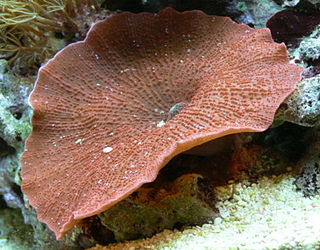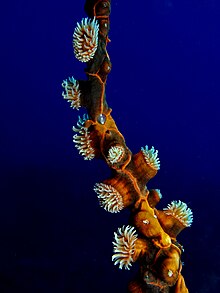
Actiniidae is the largest family of sea anemones, to which most common, temperate, shore species belong. Most members of this family do not participate in symbioses with fishes. Three exceptions are the bubble-tip anemone, snakelocks anemone and Urticina piscivora.

Edwardsia is a genus of sea anemones, the type of the family Edwardsiidae. They have eight mesenteries and live in tubes in the sand. The name, in Neo-Latin, commemorates the French zoologist Henri Milne-Edwards.

Corallimorpharia is an order of marine cnidarians closely related to stony or reef building corals (Scleractinia). They occur in both temperate and tropical climates, although they are mostly tropical. Temperate forms tend to be very robust, with wide and long columns, whereas tropical forms tend to have very short columns with a wide oral disc and very short tentacles. The tentacles are usually arranged in rows radiating from the mouth. Many species occur together in large groups, although there are recorded instances of individuals. In many respects, they resemble the stony corals, except for the absence of a stony skeleton. Morphological and molecular evidence suggests that they are very closely related to stony corals.

Hormathiidae is a family of sea anemones in the class Anthozoa.
Halcampidae is a family of sea anemones. Members of this family usually live with their column buried in sand or other soft substrates.

Bunodactis is a genus of sea anemones in the family Actiniidae.

Epiactis is a genus of sea anemones in the family Actiniidae. There are about nineteen recognised species and the type species is Epiactis prolifera.

Isozoanthus is a genus of anemone-like anthozoans in the order Zoantharia.

Sagartia is a genus of sea anemones in the family Sagartiidae. The genus was first described by Philip Henry Gosse in 1855 and the image is his painting of several species found in British waters included in his book, A history of the British sea-anemones and corals.

Cerianthus is a genus of tube-dwelling anemones in the family Cerianthidae. Members of the genus are found worldwide. They are predators, scavengers and omnivores.

Anemonia is a genus of sea anemones belonging to the family Actiniidae.

Anthomastus is a genus of soft corals in the family Alcyoniidae.

Palythoa is a genus of anthozoans in the order Zoantharia.

Sagartiogeton is a genus of sea anemones in the family Sagartiidae.

Actinostolidae is a family of sea anemones in the order Actiniaria. Members of this family are deep sea species, with some occurring at hydrothermal vents.

Actinostola is a genus of sea anemones in the order Actiniaria. All members of this genus are deep-sea species, with some occurring at hydrothermal vents.
Actinernidae is a family of sea anemones. It contains the following genera and species:
Andvakiidae is a family of sea anemones.
Anthosactis is a genus of cnidarians belonging to the family Actinostolidae.














